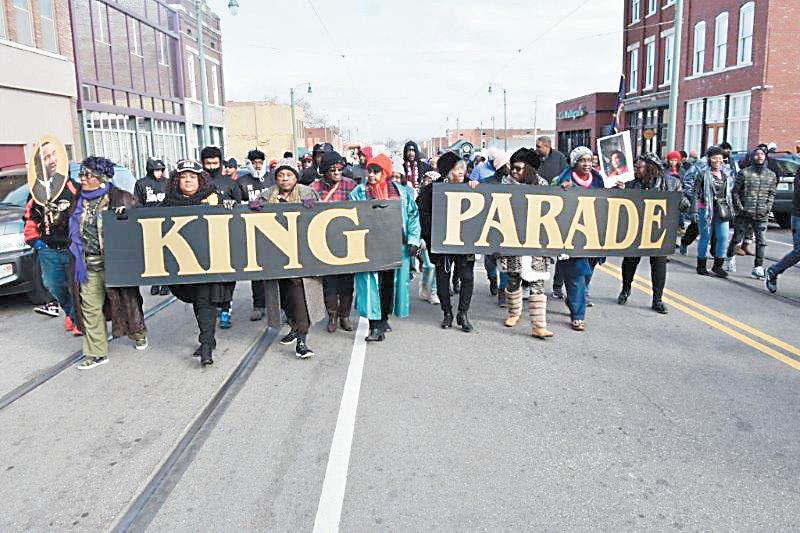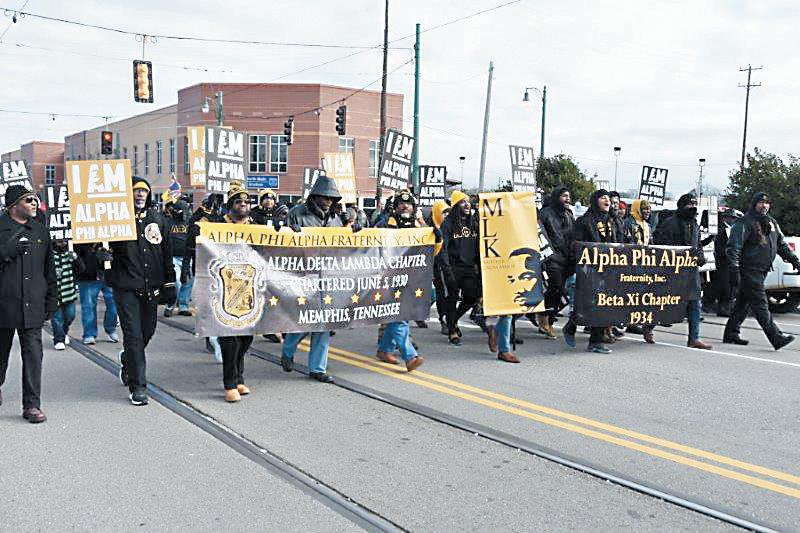What’s all the fuss about ‘Real ID.’ Do you really need one?
Community, Page 8

Why the Memphis Grizzlies shouldn’t trade Andre Iguodala – and maybe not anyone at all.
Sports, Page 11


Bali state of mind


What’s all the fuss about ‘Real ID.’ Do you really need one?
Community, Page 8

Why the Memphis Grizzlies shouldn’t trade Andre Iguodala – and maybe not anyone at all.
Sports, Page 11



Special to The New Tri-State Defender
After months of debate and voting delays, the Memphis City Council reached almost unanimous approval of an electric rate increase on Tuesday.
As a result, the monthly bills of Memphis Light, Gas and Water Division’s residential customers will increase by $8.98 over a three-year implementation period. The first increase of $3.70 will happen in July.
The final vote on the electric increase was 11 to 1. Councilman Frank Colvett was the only member to vote no, while councilwoman Jamita Swearengen abstained.
The decision came after MLGW’s CEO, J.T. Young, proposed an alternative plan at the Jan. 7 meeting. That proposal was put forth in the wake of council members shooting down another proposal last December. The council approved smaller gas and water rate hikes over the same multiyear schedule at that same meeting last year.
Support for the electric rate hike resolution didn’t come without debate or provisions. Newly-elected Councilman J.B Smiley (Super District 8-1) proposed an amendment
“I think we all agreed that power outages are our main concern. We don’t differ on the need, but we differ on the solution.”
- Dr. Jeff Warren
requiring MLGW to provide monthly reports detailing their efforts to reduce costs, a final report at the meeting in May, and to seek a legal opinion by an independent council regarding the bond issuance for MLGW’s ailing infrastructure.
Smiley’s suggestion came after Dr. Jeff Warren (Super District 9-3) questioned MLGW’s authority to use bonds to fix the infrastructure.
“I think we all agreed that power outages are our main concern,” Warren told Young. “We don’t differ on the need, but we differ on the solution.”
Warren also pushed MLGW leaders to look for additional energy supply providers outside of the Tennessee Valley Authority as a way to cut costs.
Young said he would be making a recommendation to the council regarding energy suppliers in the spring.
LeMoyne-Owen alumni honors
Dr. King with prayer breakfast tradition
by Dr. Sybil C. MitchellSpecial to The New Tri-State Defender
Hundreds gathered in the scenic elegance of Hilton Hotel East on Monday morning for the 29th Annual Dr. Martin Luther King Jr. Prayer Breakfast sponsored by the LeMoyne-Owen College Alumni Association. This year’s theme was: “2020 Vision: Be the Dream.”
The occasion brought back a favorite son, Dr. Alvin O’Neal Jackson, former pastor of Mississippi Boulevard Christian Church. Now the national executive director of the Mass Poor People’s Assembly and Moral March on Washington, slated for Saturday, June 20, 2020.
“Over 140 million people live in poverty in this country,” said Dr. Jackson. “That is nearly half the people in America. Think of it—140 million people suffering in this country, living below the poverty line. As director of the Mass Poor People’s Assembly and Moral March, I am working with Dr. William Barber and the Poor People’s Campaign. This is a national


We are Dr. King’s dream in 2020.
Interim President Carol Johnson-Dean in her greeting had generous words of gratitude for the Memphis Chapter of former students who planned and sponsored this year’s event.
“On behalf of the LeMoyne-Owen College family, I can’t thank you enough for all you do to ensure that our school’s 158-year legacy continues. Your contributions help our stu-

“Although it wasn’t a grand opening, I thought it was important to mark our second year in operation,” said owner Quavisa Henderson. “Every anniversary is a momentous occasion. I have a friend who opened up their spot the same time I did, and they are closed already.”
Henderson heaped praised on the Whitehaven community for its support, noting that, “Community support is the lifeline of any business. There would be no Electrolyfe without it.”
Get TSD News, announcements and special promotions in your email! visit TSDMemphis.com to sign up, or scan the code at right!

Seven local attorneys were honored by Mayor Jim Strickland and the City of Memphis at the third annual Luminary Awards, Monday. The event commemorating Dr. Martin Luther King Jr.’s birthday recognized the recipients as trailblazers in civil rights.
The seven attorneys honored in the Hall of Mayors at City Hall were: Walter Bailey Jr., Michael Cody, Bernice Donald, Bruce McMullen, Charles Newman, Van Turner Jr. and Allan Wade.
“Memphis continues to change the world, and it’s certainly true of its people, Strickland said during the ceremony. “These attorneys have dedicated their lives to improving our community. They are those dedicated individuals who know – just like Dr. King said – that progress takes work and sacrifice.”
The event was especially symbolic for some of the honorees who had ties to the late civil rights icon.
“I just feel so fortunate to be a small part of helping to move this community where it ought to go,” Luminary recipient Mike Cody said. “So that we’re just one family of people and not several races that fight with each other. This was Dr. King’s dream.”
Cody recalled the day before Dr. King was assassinated. He, Charles Newman and Walter Bailey Jr. – two other Luminary recipients –met with King in his room at the Lorraine Motel. Cody was instrumental in fighting a federal injunction that prevented King from leading the protest in support of the sanitation workers. He, along with another local attorney were able to win the case, but King was assassinated just hours before
“I was in awe of him,” Charles Newman said of Dr. King. “The way he was able to motivate and lead people – and it was genuine.”
the court case concluded.
Newman said he was lucky to have met Dr. King twice. Once at the meeting at the Lorraine Motel and prior to that while he was a student at Yale University.
“I was in awe of him,” Newman said of Dr. King. “The way he was able to motivate and lead people –and it was genuine.”
Newman said it sparked him to become a change agent. Since then, he has continued to contribute to the City of Memphis, including his work on preventing Interstate 40 from being built through Overton Park.
The other Luminary recipient who sat with Newman and Cody that day in 1968 was Walter Bailey Jr. A budding attorney at the time, he later became a member of the Shelby County Board of Commissioners, a position he held until he stepped down in 2018 due to term limits. His tenure made him the longest-serving commissioner in the county.
Bailey played a pivotal role in the removal of the Confederate statues in two city parks. He shared the feat with three other Luminary honorees, Commissioner Turner, Wade and Mullen.
Turner formed Greenspace, a nonprofit organization formed to take ownership of the former city parks and oversee their future development.
Wade, who has served as the City Council attorney since 1988, contributed to the statues’ removal in a

different way. He was part of the legal team that crafted a plan to assist in their removal. He has successfully defended the act in every lawsuit that’s been filed.
“There are some winners and losers in all politics,” Wade said. “So often times when I take a position on my clients’ behalf, I know that am going to inspire some anger in some people – but that’s just what you have to do when you want to elicit change.”
While serving as City Attorney, Mullen put together a team that oversaw the logistics of the sale of the
parks and removal of statues. He has also been named one of the top 100 Tennessee attorneys and top 50 Memphis attorneys.
There was a lone woman on the list of Luminary honorees. Judge Bernice Donald was the first black woman in the United States to serve as a U.S. Bankruptcy Court judge.
The trailblazer, who served more than 30 years as a federal judge, also made history when she was appointed by then-President Bill Clinton as the first black woman to serve on the U.S. District Court for the Western District of Tennessee.
“Dr. King believed that if you have the skills and the ability and persistence that you ought to be able to go wherever your talents took you,” Donald said. “And so, I feel like I stand on the shoulders of all of those people who worked very hard so that somebody like me could be here today.”
The first Luminary Awards presentation was held in 2018 and honored the 1968 sanitation workers. In 2019, 10 local women were honored for their contributions to the City of Memphis.
dents reach the heights of success in their studies and their lives.”
Dr. Johnson also touted notable recognition of two programs in 2019 “Last year, the LeMoyne-Owen College was designated as a National Center of Academic Excellence in Cyber Defense Education by the National Security Agency (NSA) and U.S. Department of Homeland Security,” she said. “Also, our business program received accreditation by the Accreditation Council for Business Schools and Programs (ACBSP), a global business education accreditation body.” Both announcements were met with enthusiastic applause.
“I was working when I first heard that Dr. King had been shot in Memphis. It was later on that night that more bad news came. He had died. I remember feeling like my advocate was gone. My voice was gone. He spoke the language of our hearts. Our champion was gone. ‘What was going to happen now,’ I wondered? What about the movement? Who would lead us now?”
— Dr. Alvin O’Neal JacksonIn the prayer breakfast tradition, several ministers made public supplication in prayer for divine favor. Rev. Charles Ewing II., pastor of Gospel Temple Baptist Church, offered prayer for “community and grace.” Pastor Anthony Sledge of St. Paul Baptist Church, Millington, prayed for “peace and justice.” The Rev. Henry L. Key, pastor of St. John Baptist Church-Vance Avenue, culminated with prayer for the college. Dr. Jackson recounted the very moment he heard that news that Dr. King had been shot.
I remember feeling like my advocate was gone. My voice was gone. He spoke the language of our hearts. Our champion was gone. ‘What was going to happen now,’ I wondered? What about the movement? Who would lead us now?

“I was 17 years old, and I had a job after school in Indianola, Mississippi. I was working when I first heard that Dr. King had been shot in Memphis. It was later on that night that more bad news came. He had died.
“I remember just going out and taking a walk down the street, and a car full of jubilant white boys yelled out the window, ‘We finally got him, Martin Luther coon.’
So yes, Dr. King is dead, but we still have a dream.


















































RESTAURANT
CONTINUED FROM FRONT
The 2nd Annual Whitehaven Black Restaurant Week extends Sunday, January 26. The week-long, special patronage salute to black restaurants is the brainchild of Pearl Walker.
“It was during the “I Love Whitehaven Week” in 2017,” said Walker. “So it started bugging me that all these people would come to the Whitehaven community for the King parade, and when the parade was over, all the people were gone in less than an hour. That would really bug me.
“So I thought, ‘What if we created a specific, more intentional effort to have people stay in the Whitehaven to eat?’ People don’t always need a cleaners or to purchase a car, or even buy insurance. But people always need to eat. I thought it would be a great idea to target our black restaurants.”
Memphis City Council Chairperson Patrice Robinson, who represents the area, was on hand to salute Electrolyfe and Whitehaven Black Restaurant Week. She presented commemorative proclamations to Henderson and Walker.
The Rev. Dr. Earle J. Fisher, senior pastor of Abyssinian Baptist Church in the heart of Whitehaven, touted the importance of supporting African-American businesses.
“Any thriving and stabilized community has a system and strategy to keep its resources circulating within it before they are funneled out of it,” he said. “Whitehaven can lead the way in black economic stabilization and sovereignty. It starts with an intentional and unified support of black businesses within our community.
“And instead of giving tax breaks to corporations who don’t need them, we should make investments in small, black-owned businesses to help stem

Memphis
the tide of corporate welfare and economic inequity.” Henderson said her juice bar also serves fresh, organic selections, including: salads, grilled chicken wraps, grilled salmon wraps, Cajun turkey melt, grab-n-go wraps for those in a hurry, and other organic choices.
Electrolyfe Juice Bar is located at 4466 Elvis Presley Blvd. A second location was opened in the Hickory Hill community at 3724 S. Mendenhall. It has been open since July, 2019. The following restaurants signed up for this year’s Whitehaven Black Restaurant Week. Walker encourages patronage throughout the week and all year round of these and other eateries in the community.
Bala’s West African Bistro
2160 Raines Rd
901-509-3024
Hours: Monday-Saturday, 11 a.m.9 p.m.; Sunday, noon to 8 p.m.
Egg King Café 4458 Elvis Presley Blvd.
901-249-3690
Hours: Monday-Saturday, 7 a.m.-3 p.m.; Sunday, 7 a.m.-2 p.m.
Eggactly Breakfast & Deli
1248 Marlin Rd. 901-729-7598
Hours: Tuesday-Saturday, 7 a.m.-2 p.m.; Sunday Brunch, 10 a.m.-3 p.m.
Electrolyte Juice Bar
4466 Elvis Presley. Ste. 164 901-244-6727
Hours: Monday-Saturday, 9 a.m.-5 p.m.
Kountry Cookin’ 1128 Winchester Rd. 901-345-5505
Hours: Sunday-Saturday, 11 a.m.-5 p.m.
Uncle Lou’s 3633 Millbranch Rd. 901-332-2367
Hours: Monday-Saturday, 10:30 a.m.-8 p.m.; Sunday, 11 a.m.-5 p.m.


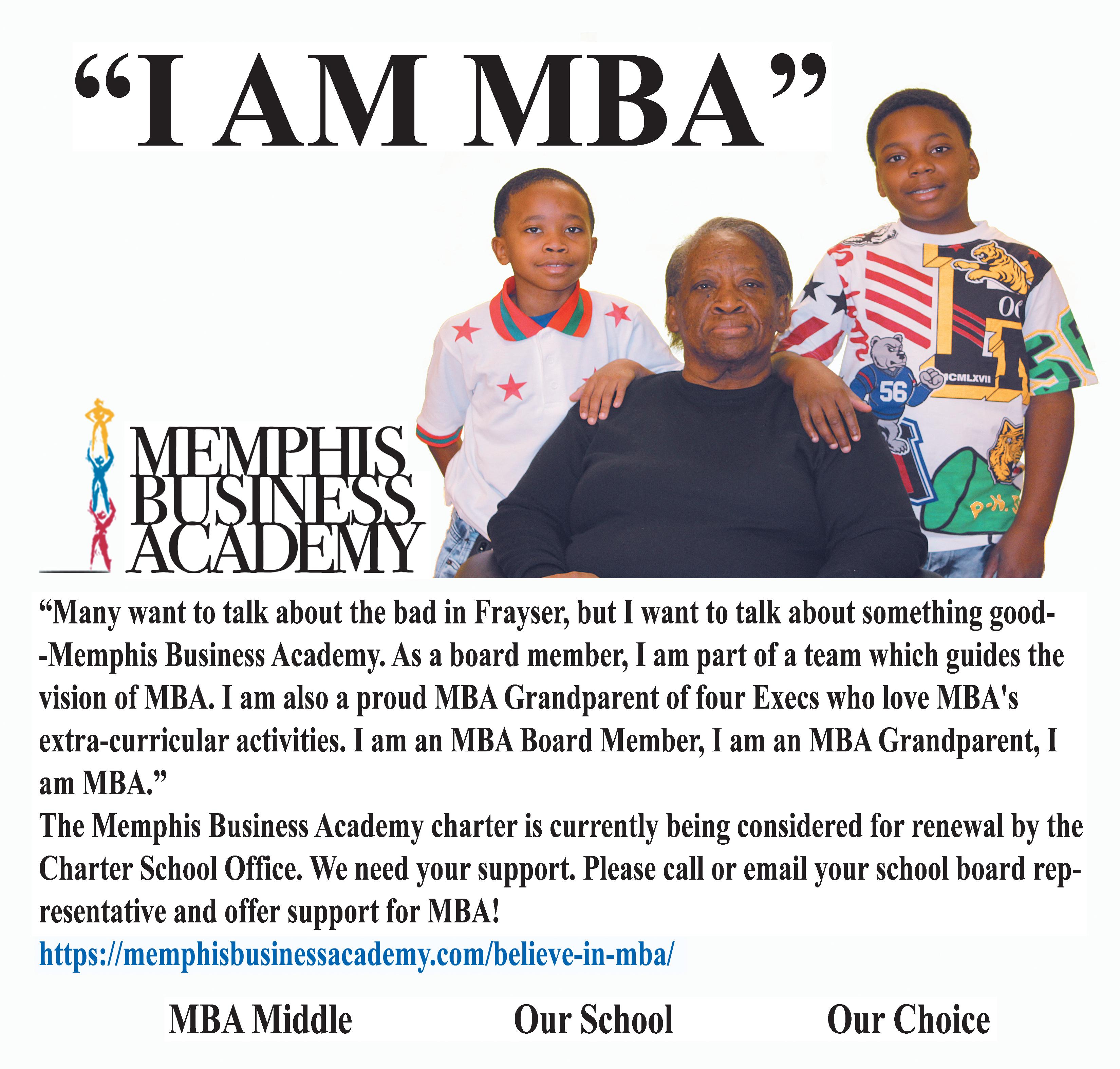
MLK Day panel’s probe yields related views of Dr. King’s ‘radical’ Economic agenda
by Dr. Sybil C. Mitchell Special to The New Tri-State DefenderDr. King’s radical economic agenda was the discussion topic as the 100 Black Men of Memphis convened an MLK Day gathering at the Events center in Midtown on Monday afternoon.
Three panelists – Rhodes professor Dr. Charles W. McKinney, University of Memphis researcher Dr. Elena Delavega and Dr. Earle J. Fisher, founder of #UpTheVote901 and Abyssinian Baptist Church pastor, were the panelists.
Guiding the discussion was Wendi C. Thomas, editor of MLK50: Justice through Journalism. The panel came as the 100 Black Men of Memphis plan to focus on economic development within the African-American community.
The panelists agreed that banquets, celebrations and service projects are no substitute for what likely would still be King’s main focus: working to end poverty. Fisher denounced local politicians he believes are responsible for the continued rise in poverty.
“In the City of Memphis, conditions have been manufactured that ensure certain people have more than they will ever need, and most other people have less than they will always need,” Fisher said.
“Certain people who are oligarchs, people who are plutocrats, people who are part of the Chairman’s Circle, people who are part of Memphis Tomorrow, people who are a part of the Chamber of Commerce,” Fisher
continued, “these people have structured an environment where you have certain people who are always asking for what they deserve to have, while other people are being granted things they don’t need.”
McKinney echoed the desire for more action and less pageantry.
“King had no tolerance for inertia. King would have no tolerance for us gathering in his name without addressing the soul-crushing poverty that is increasing in a moment — wait for it — of momentum,” McKinney said, mocking the city’s catchphrase for its current building boom. “How are we in a moment of momentum when the poverty rate for a bunch of folk who look like y’all is increasing?”
Delavega, who regularly publishes reports on poverty in Memphis, pointed to the Poor Peoples’ Campaign as Dr. King’s next movement.
“We have a big math problem,” she said. “Resources and wealth are unequally distributed. The average white person in Memphis has a median income that is higher than that same group on the national average.
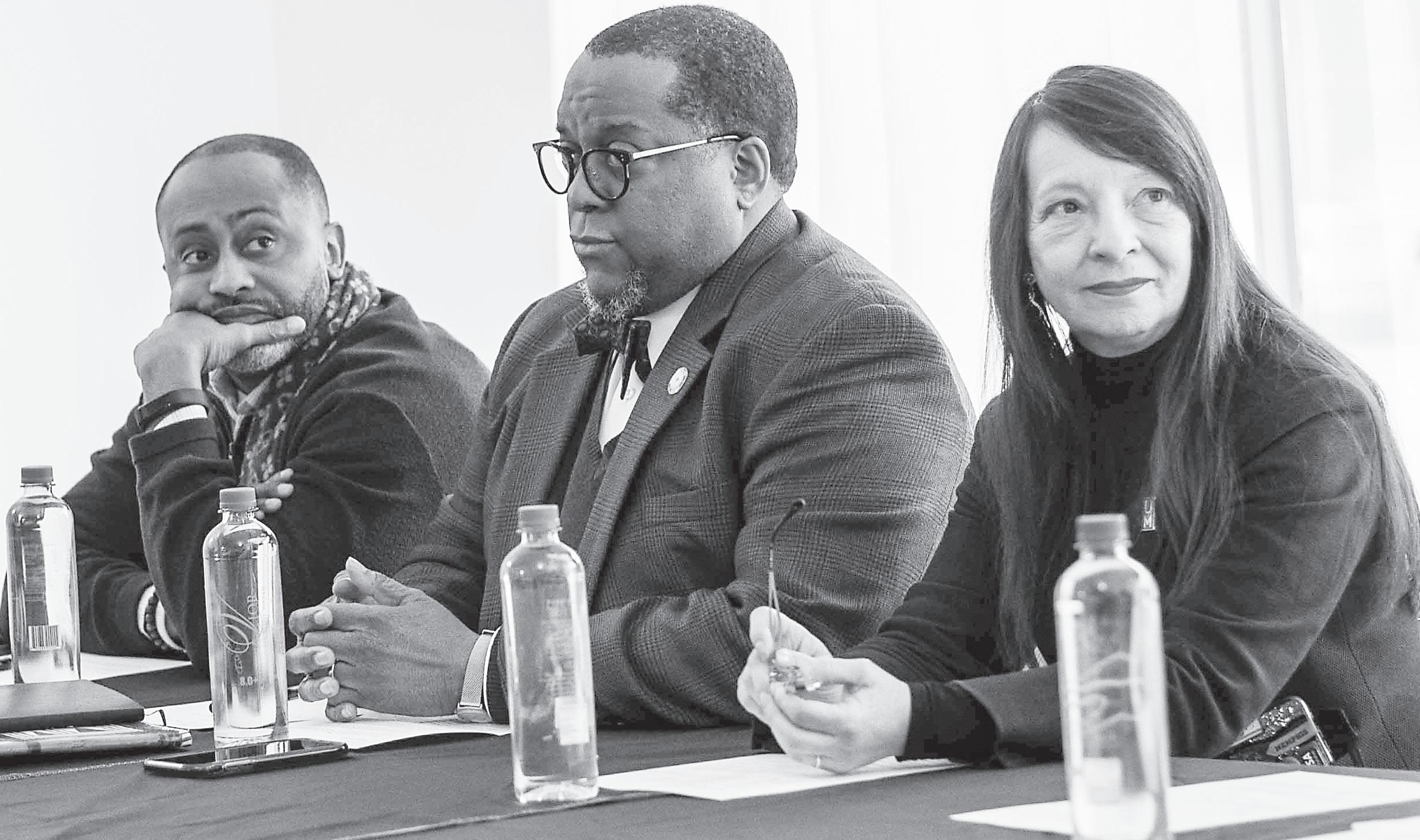

“The poor are getting blacker, and the rich, whiter,” she said. “They keep saying, ‘Show us the metrics.’ Well, I’ve been showing the metrics since 2011. In Memphis, a black person is making 50 percent of what a white person is making. Unless we can say that a white person in Memphis is NOT twice as rich as a black person, and black kids are NOT three times more likely to live in poverty, then what we have been doing is not working.”
McKinney, who advocates action along with protests, said one way to get the attention of power brokers is through the dollar – specifically, boycotts.
“We have to speak in a language everyone understands. Hey, wages are terrible. Hey, we’re not being allowed to vote. Hey, the cops are brutalizing us. Well, we don’t hear you. Oh, okay. Let’s try this. None of us are going to work for the next 14
days. And how about this? None of us is getting on the bus from December 1955 to some time in 1956.
“Now that the bus system has been crippled, can you hear me now?” he said. “Are you ready to sit down and have a conversation we can understand?”

Dr. Fisher, like Dr. McKinney, believes in demonstration and protests, marches and any other modes of resistance that will draw attention to the issue of poverty and its related concerns. “If I were to summarize Dr. King’s agenda in ’68, it would be inequity,” Fisher said. “And being the resident theologian on the panel, I’m going to say that Biblical inequity is a sin…King came into town to fight for sanitation workers who were not earning a livable wage. We still have people in this city who are employed by the big corporations who receive tax breaks from the city…and still don’t pay a living wage.
In an exclusive telephone conference with the Black Press of America, the Rev. Dr. William Barber and his Poor People’s Campaign CoChair, Rev. Dr. Liz Theoharris, said America has a moral crisis.
“Democrats run from poverty and Republicans racialize poverty,” Dr. Barber stated during the more than one-hour discussion.
“We have invited both sides of the political fence. We’ve invited the White House to come and talk with us. They’ve refused,” stated Dr. Barber, the founder of Repairers of the Breach, a national leadership development organization, which expands upon his Moral Monday movement.
“This administration has been virtually silent on the issue of poverty. The president talked about unemployment being down, but underemployment is up. The number of people that have dropped out of the workforce is up,” said Dr. Barber, who, along with Dr. Theoharris, and others launched the Poor People’s Campaign, spearheaded initially by Dr. Martin Luther King Jr.
The Campaign conducted what it said was a 50-year audit of systemic

racism, poverty, ecological devastation, and the war economy in the U.S. They said the findings have already helped to inform and build state and local, nonpartisan fusion movements that are committed to challenging laws and policies that are antithetical to the broad tenets of social justice.
Dr. Barbara and Theoharris, who is a pastor from New York, pointed to figures that show 140 million poor and low-wealth people live in the United States – from every race, creed, sexuality, and place.
“We aim to make sure these individuals are no longer ignored, dismissed, or pushed to the margins of our political and social agenda,” Dr. Theoharris stated.
With 2020 counting as a pivotal election year, Dr. Barber said voter suppression laws in many states have only contributed to poverty.
The Poor People’s Campaign has noted that, since 2010, 23 states have passed racist voter suppression laws, including racist gerrymandering and redistricting statutes that make it harder to register.
Because of this, early voting days and hours have reduced, officials have purged voter rolls, and there have been more restrictive voter ID laws.
Following the Shelby County v. Holder Supreme Court case, which gutted key provisions of the Voting Rights Act, 14 states had new voting restrictions in place before the 2016 Presidential election, and there were 868 fewer polling places across the country, according to the Campaign.
While these laws have disproportionately targeted Black people, at least 17 states saw voter suppression cases targeting American Indian and Alaskan Native voters in 2016, Dr. Barber stated.
“Thirteen states that passed voter suppression laws also opted not to accept expanded Medicaid benefits offered under the Affordable Care Act,” he added.
“These attacks follow a broader pattern of restricting and curtailing democratic processes by drawing on legacies of racism to undermine local efforts to organize for better conditions,” Dr. Barber stated.
As of July 2017, 25 states have passed laws that preempt cities from adopting their own local minimum wage laws. Most of these are in response to city councils passing or wanting to pass minimum wage increases.
“We found that people can work a minimum wage job and can’t afford a
two-bedroom apartment,” Dr. Barber said. “We found out that there are 2 million people who work every day for less than the living wage. Some of them live in their cars, and they go to work every day.”
The Poor People’s Campaign is organizing the Poor People’s Assembly and Moral March on Washington, June 20th, during which Dr. Barber said they would rise as “a powerful moral fusion movement to demand the implementation of our moral agenda.”
Dr. Barber said some of those living in poverty would attend and speak for themselves. He stated that it was essential to know that poverty comes in “all colors” and that it’s more than just African Americans who are struggling.
Also, Dr. Barber noted that 6.1 million people had been disenfranchised because of felony convictions, including one in 13 Black adults.
During the call, Dr. Barber continued to lash out at the current administration’s controversial immigration policies. The Poor People’s Campaign has found that undocumented immigrants contributed $5 trillion to the U.S. economy over the last ten years.
They paid $13 billion in Social Security in 2010, but only received $1
“Some people want to believe if we get just enough black people on the city council, if we could just get enough black people in the board room…then we will move forward just because we have black folks in places and spaces,” Fisher added. “But it just doesn’t work like that.”

billion in benefits.
They also pay eight percent of their income in state and local taxes, while the wealthiest one percent pay just 5.4 percent. Yet undocumented immigrants and most lawfully residing immigrants are barred from receiving assistance under the major public welfare programs, causing hardship for many poor immigrant families.
In fact, among the 43.7 million immigrants in the U.S., there are 19.7 million – undocumented and lawfully residing – who cannot vote, Dr. Barber noted.
“So, we have to understand the history of systemic racism. And we have to see how systemic racism is impacting not just people of color, but also white people today,” Dr. Barber stated.
(Follow
Stacy M. Brown, NNPA Newswire senior correspondent, @ StacyBrownMedia.)

The Fifth Annual MLK Dreamkeepers Workshop presented by the Western Region of the First Episcopal District of the CME Church was held at Mt. Olive Cathedral CME on Monday. Among the special guests (r-l): Memphis City Councilwoman Cheyenne Johnson, Sheriff Floyd Bonner Jr. and his wife, Audrey, and the Rev. Amina McIntyre. (below) Keith L. Brown – “Mr. I’m Possible” – was the general session motivational speaker. (Photos: Tyrone P. Easley)

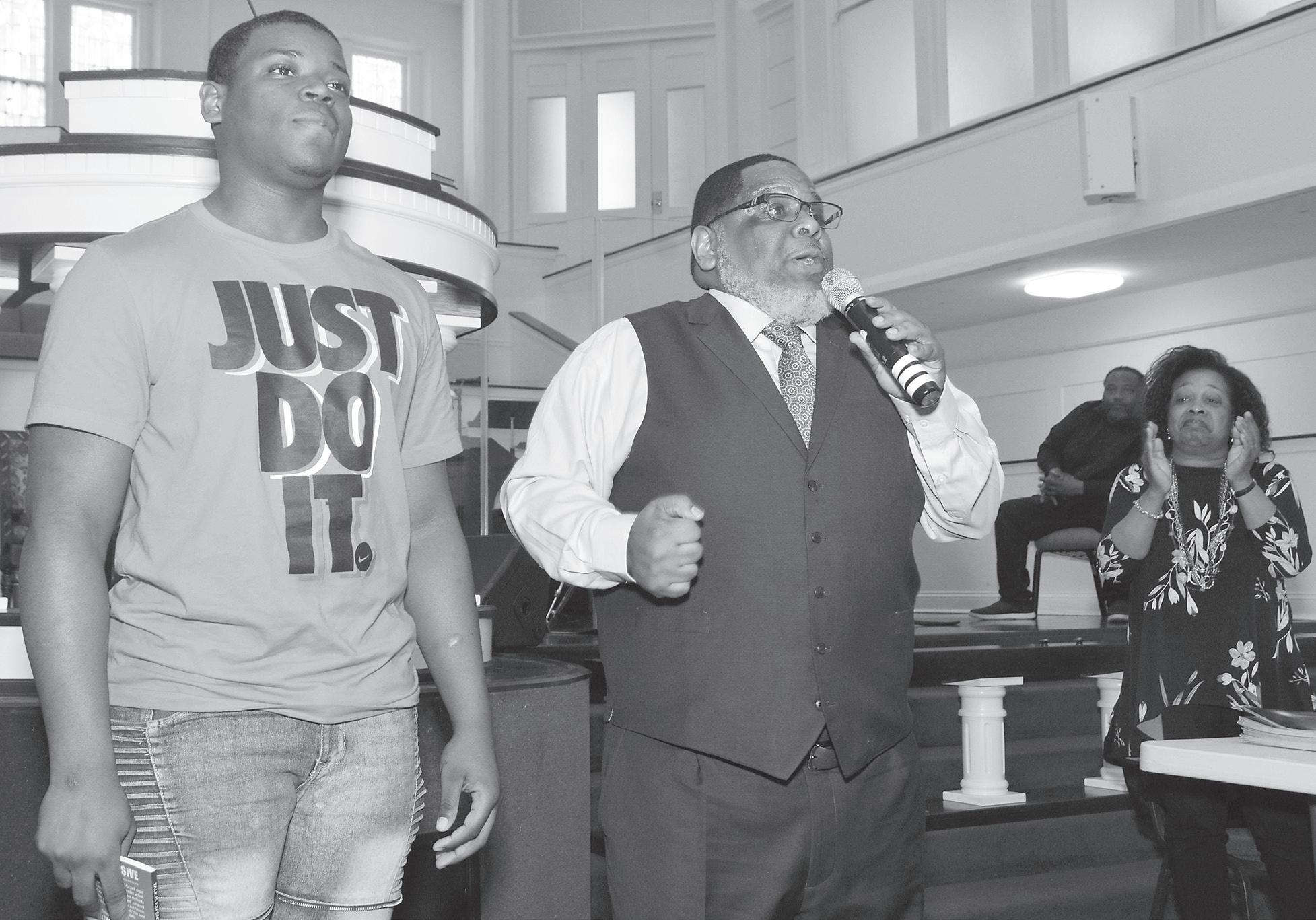
The family and friends of Deacon Dwight Aloysius Mathis celebrated his homegoing at Liberty COGIC last Saturday (Jan. 18). Mr. Mathis passed away Jan. 8. He was 54. (Photo: Tyrone P. Easley)


TSD Newsroom
Vincent Tharpe – well known as the impassioned front man of the three-time Stellar Award nominated praise and worship ensemble Vincent Tharpe & Kenosis – has been appointed worship pastor of All Nations Worship Assembly, Memphis. All Nations Worship Assembly, Memphis is a church plant of the fast-growing All Nations Fellowship headed by Apostle Matthew Stevenson. The Memphis location was started in 2017. Its senior pastor is the Rev. Brandon Clack.
“Vincent Tharpe has found a way to marry excellence and experience, presentation and power,” said Clack. “His songs send seasons of relief to the barren, broken and bitter. He is a necessary sound sent from Heaven!”
Vincent Tharpe & Kenosis recorded new live music this past fall and will have a new single serviced to radio in February.
A celebrated songwriter and choir director, Tharpe’s marks of distinction include his “willingness to empty himself so that he is 100 percent used by Christ.”
“The Black & White Experience” – the ensemble’s latest live recording – features Lisa Knowles-Smith, Candy West, Myron Butler, Cristabel Clack and other dynamos well known in the Urban Worship canon. The first single – “Glory Up” – will be serviced to radio in February.

The ensemble also recently taped the Bobby Jones Show for the Impact Network, along with Tye Tribbett and Kim Burrell.
Vincent Tharpe & Kenosis is managed by industry veteran and Memphis native Zantino Kimmons, who catalyzed the success of powerhouse Lisa Knowles as well as her ensemble The Brown Sisters.
Kimmons’ One Voice Media is also home to the Stellar Award-winning children’s group Anointed by God. In addition to being an accomplished artist manager and label head, Kimmons is musical choirmaster for Brown Missionary Baptist Church Mass and Sanctuary choirs in Southaven.
(Experience the music ministry of Vincent Tharpe on Sundays at 9:30 a.m. at All Nations Worship Assembly – Memphis, 3592 Knight Arnold Rd.)


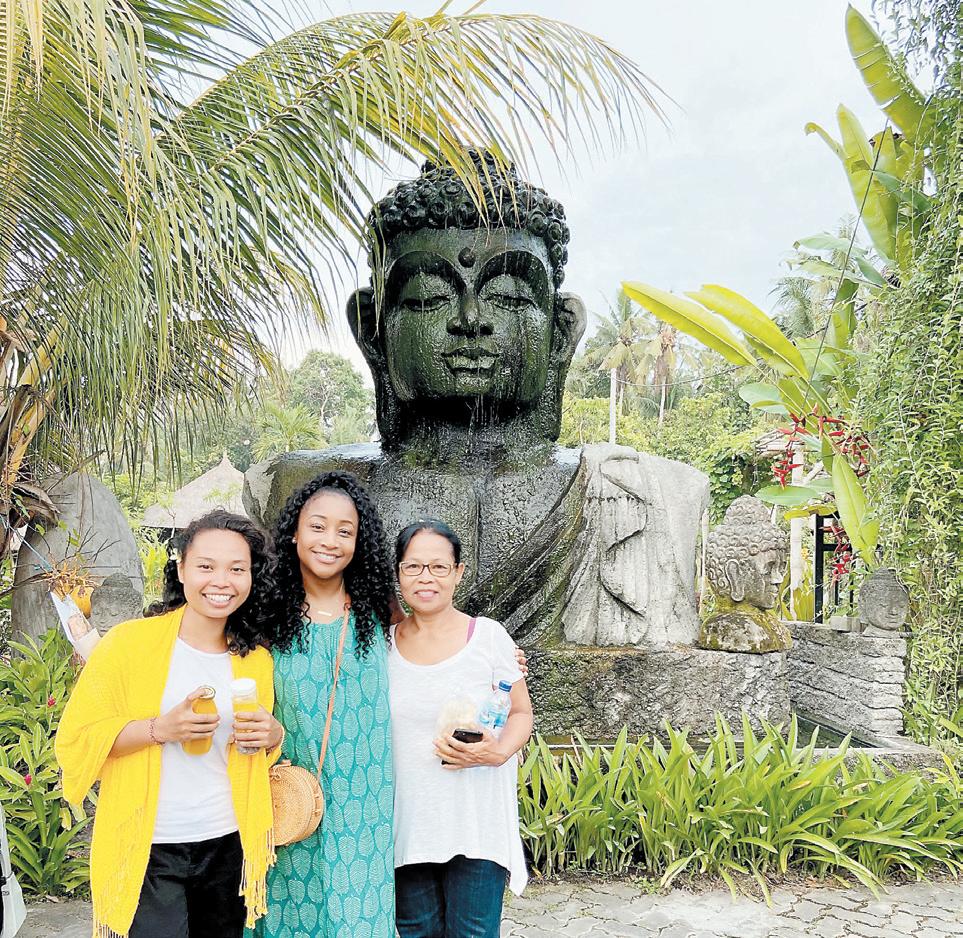 by Erica R. Williams Special to The New Tri-State Defender
by Erica R. Williams Special to The New Tri-State Defender
“L
ook at that view,” my driver Gade said to me, as he marveled over the pictur esque view of bright green rice fields with high mountaintops serving as their back drop. We were in Sidemen, a small valley town east of Ubud, Bali where I was staying.
Gade, who spent much of his time serving as a private driver, admitted that he’d seen the striking view at least a hundred times before, but was always impressed by its beauty.
“It’s the small but beautiful things like this,” he murmured, in what some would consider broken English.
But I understood him clearly. And I agreed.
Throughout my trip in Bali, I would progressively learn to appreciate the simple things – like the many traces of untouched nature throughout the island and the frequent smiles from strangers – all while allowing myself to marvel over the small things, just as Gade was doing with the countryside view.
Bali almost forces you to do that – to slow down and reflect on the simple things that are often taken for granted. Over the course of the next few days, I would relax, reset, and grow spiritually through lessons learned from the Balinese culture.
I’d decided to travel solo to the small Indonesian island for my birthday. Although most parts of Bali are considered safe and feature a host of tourist attractions, I specifically chose the town of Ubud – known as the soul of Bali – because I was clear why I was taking this trip: I wanted to feed my soul.
“What’s your itinerary?” one of my friends asked me before I left for my seven-day adventure. “We need to know everything, because you’ll be over there by yourself.”
“I’ll send it,” I replied; but never did. The truth was I didn’t have one.
Although notably a type-A personality who usually relies on checklists, itineraries, and anything else that could provide some level of security, this time I wanted to be spontaneous and experience what Bali had to offer – free of expectations and to-do lists. Visiting Sideman was one of those spontaneous things. Before then, I’d spent a bit of time at some of Ubud’s higher traffic, areas – like Pura Lempuyang (known as the Gates of Heaven) and Tegallalang

Rice Terrace. While the experiences were amazing, they also prompted me to want to immerse myself more in the Balinese cul ture. The people – usually equipped with warm smiles and kind words – had infec tious spirits that made you want to know more about them.
Spirituality is a big com ponent of Balinese culture. It’s the reason many tour ists visit the tiny island, hoping to gain a sense of spiritual renewal.
Most Balinese residents are practicing Hindus, who take the act of daily ‘offer ings’ seriously. Known as canang sari, the ancient rit ual carries a deep meaning in Balinese culture, serving as a sacred form of gratitude and representation of devotion to their (Hindu) god. It’s common to see the canang sari offerings – usually a palm-leaf basket filled with flowers and small pieces of food or money – on temples, shrines at people’s homes, or even on the ground surrounding businesses.
Usually equipped with warm smiles and kind words, the people of Bali had infectious spirits that made you want to know more about them, said Williams (center).

“I can’t help but to be happy,” Gade said to me more than once. “I am close with God, surrounded by nature and I have my family.”
He added, “And when I’m feeling bad, I go back to my center and pray and meditate.”
I didn’t have to practice Hinduism to appreciate the commitment to spiritual growth from the Balinese people. My short stay in Bali provided me with a few powerful lessons that have aided in my own spiritual journey, specific to my faith.

I learned to focus more on gratitude, while making a deeper commitment to prayer and meditation. I also realized that life is as interesting as an inter-
esting person. In Bali, I’d reverted back to a childlike curiosity, amazed by the ‘simple things’. There is beauty in an inquisitive spirit.

Additionally, I learned to slow down and allow myself to be present in the moment, while focusing on the people and things right in front and me. From my non-touristy experiences that included making herbal remedies
a
talks with the locals about the sacredness of their temples, I left the island with a sense of clarity and renewal.
Bali, full of its beautiful attractions and rich culture, makes you do that. It makes you slow down and marvel over the simple things.
and long
with Balinese family, venturing to the jungle for a coconut oil tour, Local vendors prepare their wares for market in Bali. (Courtesy photo) Left: Bali is known for its spirituality. At left, Erica Williams spends some time meditating with a local practitioner. Above: There’s no shortage of scenic views in Bali. (Courtesy photos) “Bali almost forces you to slow down and reflect on the simple things that are often taken for granted.” – Erica R. Williams at Pura Lempuyang temple, also called “The Gates of Heaven.” (Courtesy photo) (Courtesy photo)



BALI: TOP FIVE
Before planning a trip to Bali, keep in mind that the U.S. dollar goes a long way in Indonesia. One American dollar is equivalent to 13, 9000 Indonesian rupiahs (IDR), which is regarded as an exotic currency by the foreign-exchange business.
Additionally, Bali’s people, attractions, and culture can be a great vacation destination for a wide gamut of people including solo travelerss (like me) who are looking for a safe spot for spiritual renewal or couples desiring a beautiful honeymoon getaway.
Hanging with the Monkeys in Karangasem Regency
While the Sacred Monkey Forest is a popular tourist attraction in Bali, I opted for a less structured experience. As my driver and I were heading back to Bali from The Gates of Heaven, we passed a small town where monkeys were congregating in a large space, roaming freely. It was a sight to see. And don’t worry, it’s safe!
Visiting the Sacred Pura Gunung Kawi Temple
While there’s an abundance of temples to visit in Ubud, one of my favorites was Puru Gunung Kawi. The large temple complex is located at the bottom of a lush river valley and features a beautiful lake, allowing for fish-feeding. Additionally, it’s a great place to meditate, pray, and reflect.
* Mostly all large temples have sarongs available to rent or purchase, because men and women are expected to be covered upon entering the sacred spaces.
Coconut Oil-Making Tour

Erica Williams reported the best time making coconut oil in the Balinese jungle with this woman. (Courtesy photo)
Shopping at Ubud Market
This was by far one of my favorite experiences. I spent hours with a small Balinese family, who led me to the jungle to make coconut oil. I know it sounds creepy, but it was a safe experience, backed by a credible tour company. The excursion was really more like hanging out with new friends while making coconut oil in the midst of nature.
Walking through the Tegallalang Rice Terrace
This is probably the most ‘touristy’ thing on my list of favorites. A leading tourist attraction in Bali, I almost refrained from going to Tegallalang because of the potential of crowds; but I’m glad I did. The rice terraces provide a beautiful view of the terraced hillside. Additionally, there is a famous “Bali swing” and other activities for visitors.
Featuring a series of various markets, the Ubud Market served as a location in the hit movie, “Eat Pray Love” starring Julia Roberts. Selling an eclectic mix of handmade arts, the busy marketplace was a great place to get souvenirs, fresh fruits and vegetables.

ballots. However, that is not true, said Suzanne Thompson, spokesperson for the Shelby County Election Commission.
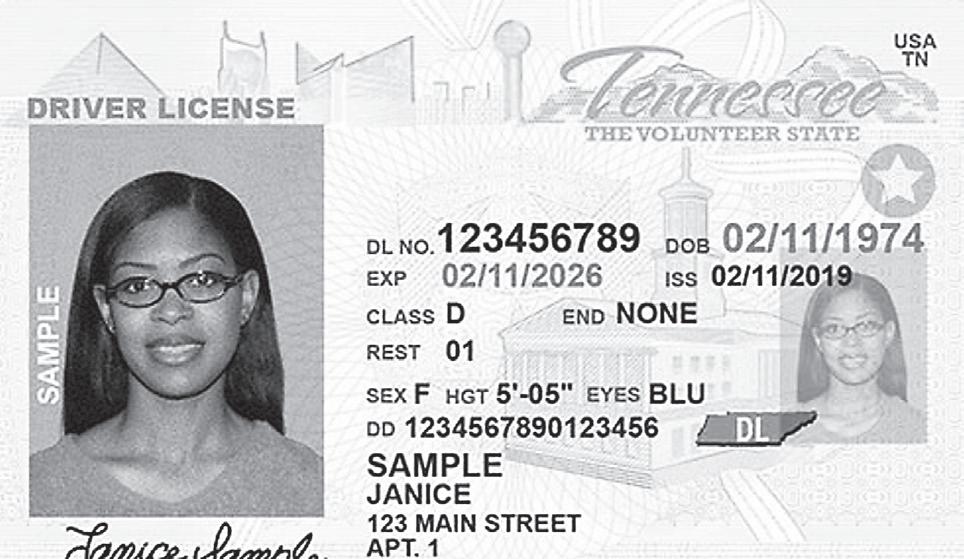

Come October 1, a new level of enforcement will come into play relative to the Real ID Act that Congress passed in 2005 in the wake of the terrorist attacks that rocked the country on Sept. 11, 2001.
It has taken the federal government 15 years to implement the act fully. The gradual process has been met by some confusion as each state has a different status. All states will need to be in compliance by Oct. 1, 2020. The confusion has included whether a Real ID is needed to vote, with some spreading the word that, yes, such an ID would be needed to cast
A form of identification that meets increased security standards for state-issued driver’s licenses and identification cards, the Real ID is aimed at eliminating airline terrorism by increasing requirements to obtain documents granting access to domestic planes.
To be in compliance, a driver’s license or state-issued ID card must have a gold circle and star in the upper right corner. An easy way to know if your card is not compliant is if it says “not for federal identification” or “federal limits apply.”
The Real ID’s purpose is to tighten
“This is a federal initiative. Tennessee is late coming on board and the deadline to have a Real ID with a gold star is October 2020.”
— Wanda Halbertcontrols on the comings and goings of travelers and it is necessary for anyone flying domestically. A passport can be used as a substitute. The document is needed when boarding planes, or when entering a federal facility like an army base, or a nuclear facility.
The Real ID can be obtained at the Shelby County Clerk’s Office at 150 Washington St., or at the De-
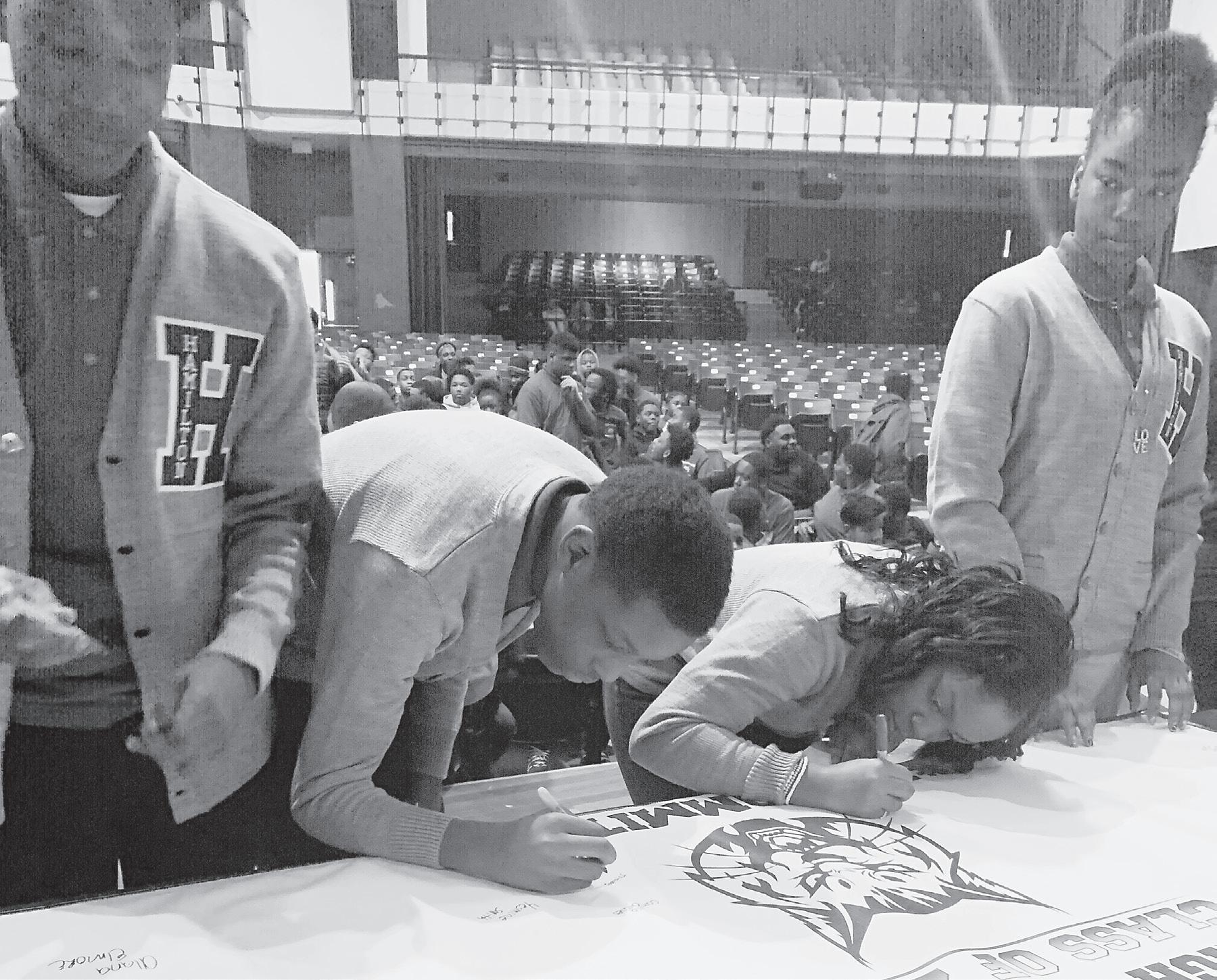

partment of Motor Vehicles centers at 5266 Summer Ave. and 3200 East Shelby Dr. “This is a federal initiative,” said Shelby County Clerk Wanda Halbert. “Tennessee is late coming on board and the deadline to have a Real ID with a gold star
or certified.
In a statement, the Rev. Dr. Earle J. Fisher, founder of UptheVote901 and a principal organizer of last year’s Memphis People’s Convention, said community organizers would have symposiums throughout 2020 on the Memphis People’s Convention agenda to cover ID issues.
“We will discuss other voter empowerment measures as well,” Fisher said. “To that end, we’ll be educating the community on issues of IDs, registration and other challenges.”
At Hamilton High School, the Freshman Academy is on a mission – to get as many members of the Class of 2023 to graduate as possible.
Within the Academy are “Ambassadors,” who provide peer tutoring and leadership.
Last week, a high-profile community leader, Shelby County Sheriff Floyd Bonner Jr., visited the school to deliver encouragement.
Bonner, the first African American elected the county’s sheriff, shared his upbringing in Orange Mound as he made the point that the students could become whatever they dreamed of and worked to achieve.
“The purpose of the Freshman Academy is to provide guidance to freshman students transitioning to high school and provide them with resources that will help them be successful during their freshman year,” said Cicely Brooks, coordinator of the Freshman class.
“I was very excited Sheriff Bonner took out the time to speak with and encourage our students to be committed to their education and graduate in the class of 2023.”
 Known as a straight talker, Shelby County Sheriff Floyd Bonner Jr. delivered just such a talk to the Hamilton High School Freshman Academy.
Hamilton High School Freshman Academy Ambassadors pictured (front, l-r) are Carmen Castillo, Faith Jackson and Coordinator Cicely Brooks and Brenda Joiner; (back) LaDarius Telford and Jatavious Whitaker.
The Ninth Grade Commitment Banner is being signed by Freshman Academy Ambassadors (l-r): LaDarius Telford, Jatavious Whitaker, Brenda Joiner and Faith Jackson. (Photos: Shirley Jackson)
John Semien Special to The New Tri-State Defender
Known as a straight talker, Shelby County Sheriff Floyd Bonner Jr. delivered just such a talk to the Hamilton High School Freshman Academy.
Hamilton High School Freshman Academy Ambassadors pictured (front, l-r) are Carmen Castillo, Faith Jackson and Coordinator Cicely Brooks and Brenda Joiner; (back) LaDarius Telford and Jatavious Whitaker.
The Ninth Grade Commitment Banner is being signed by Freshman Academy Ambassadors (l-r): LaDarius Telford, Jatavious Whitaker, Brenda Joiner and Faith Jackson. (Photos: Shirley Jackson)
John Semien Special to The New Tri-State Defender
Castalia Baptist Church is accepting applications for its fifteenth annual college tour. Under trustee Meka Egwuekwe, the church will lead more than 40 high school students on a tour of eight historically black college campuses in Mississippi, Louisiana, and Texas as part of its annual rotating schedule of tours.
This year’s tour coincides with the beginning of Shelby County Schools’ spring break and is open to all students from grades 9 to 12, regardless of religious affiliation or school district. Starting March 16 and continuing through March 19, students will visit the following colleges and universities:
• Jackson State University
– Jackson, MS
• Tougaloo College – Jackson, MS
• Dillard University – New Orleans
• Xavier University – New Orleans
• Prairie View A&M University – Houston
• Texas Southern University – Houston
• Wiley College – Marshall, Texas
• Grambling State University -- Grambling, La.
The cost of this year’s college tour is $130 for members of Castalia, and $335 for non-members. The deadline for applications and the required $35 deposit is February 26, with all final payments due at orientation on March 9 at 6 p.m.
Students can find the application on the Castalia Baptist Church website at http://castaliachurch.org.
For more information: Contact Meka Egwuekwe at 901-484-4203; email emeka2001@gmail.com.
(Castalia Baptist Church is located at 2180 Airways Blvd. The pastor is the Rev. Dr. Randolph Meade Walker. For more information, visit, http://castaliachurch.org.)
Boys & Girls Clubs of Greater Memphis will host their annual Youth of the Year Competition on February 5th at The University Center Theater on the University of Memphis Campus from 6 p.m. to 8 p.m.
Youth of the Year is the highest award available in the Boys & Girls Clubs organization, with the objective of recognizing exceptional Boys & Girls Club members and providing them a voice and path to showcase their character, leadership and personal development.
Youth between the ages of 14 and 18 are eligible to compete representing the club they attend.
The 2020 competition, presented by HigherVisi-
bility, will have six Club members competing for the 2020 title. Candidates must complete an application with supporting materials that are professional and well-assembled for a favorable first impression on the judges.
In addition, they must write three essays that focus on their Club Experience, Vision for America’s Youth, and Personal Brand, which will be judged for content, clarity and overall quality.
The judging panel will include a select number of community members. The candidates will each provide a three-minute speech based upon the content of their three application. After the speech they will conduct a 15-minute personal interview with questions from the judges.
The winner will receive a pre-determined scholarship and represent the Boys & Girls Clubs of Greater Memphis at various events, including state competition in Nashville.
(To join BGCM as a member of the audience, RSVP to RachelR@bgcm.org. For more information, visit https:// youtu.be/Z3zFJhOy3xQ.)
Slave Haven Underground Railroad Museum Director Elaine Turner has issued an invitation to come see why MSN. Com has listed the historic site as one of the best places to visit in the United States during Black History Month.
Slave Haven is joined by the Stax Museum of Soul Music and the National Civil Rights Museum as part of a guide crediting must-see African American history sites present throughout the nation.
“We are elated to be listed on such a prestigious list of African American institutions in the United States that serve as a platform to interpret and share the achievements and struggles of African Americans that are essential to this country’s history,” Turner said.
Located at 826 North Second Street on land once known as the Burkle Estate, Slave Haven served as a stop on the Underground Railroad. “It is a breathtaking monument to endurance and democracy,” said Turner. “Visitors can feel the perseverance of the enslaved Africans who would not stop fighting to gain their freedom, but also the risks taken by the visionary abolitionists who were the upholders of American democracy.”
BRIEFLY: Shelby County Commissioners Tami Sawyer and Eddie Jones and Shelby County Mayor Lee Harris will host a Deed Transfer Ceremony with the Klondike-Smokey City Community Development at 11 a.m. on Friday (Jan. 24) at the CDC office an 943 Vollintine Ave. Shelby County is transferring 150 properties in a landmark community development agreement.

Harry Williams, Dwania Kyles and Menelik Fombi integrated Bruce Elementary School in 1961. The trio was part of the Memphis 13 that broke the old Memphis City Schools’ racial barrier. Twenty-feet tall images of the three were on display in the school’s auditorium during a recognition ceremony last Friday (Jan. 18).
Enterprises)
 by Dr. Sybil C. Mitchell Special to The New Tri-State Defender
by Dr. Sybil C. Mitchell Special to The New Tri-State Defender
Nearly two weeks prior to Vice President Mike Pence touching down in Memphis, officials at the National Civil Rights Museum received word that he wanted to visit during the Dr. Martin Luther King Jr. weekend celebration.
“Secret Service initially contacted us about a week and a half prior to the vicepresident actually coming,” said Faith Morris, the museum’s chief marketing. “I asked his team directly, and then I asked him, ‘Why do you want to visit the civil rights museum?’”
Pence’s answer struck Morris and other museum principals as the “right reason” for coming. His presence set off a hot debate.
“He said to me, ‘Growing up, I had two heroes: John F. Kennedy and Dr. Martin Luther King Jr. I grew up studying his teachings, and I wanted to be in a place where Dr. King was during the observance of his life and work.’ At that point, we believed that Vice-President Pence was coming to the museum for the right reasons,” Morris said.
“But before moving ahead with preparations by the Secret Service advance team, I made it clear that there would be no campaigning activity in this very high-stakes election year.”
Many labeled the visit a calculated move to “garner favor with black voters because Trump’s administration is overwhelmingly opposed by African Americans.”
“Trump is no fool, he just acts like it,” said former Shelby County Director of Veteran Services Joseph Kyles. “Pence’s visit was not out of some deeply held respect for Dr. King. It was a calculated move to sway us and try to make us believe that this administration really cares about black folk. And we know from Trump’s remarks and actions relating to people of color that it’s just not the truth.”
Reflecting, Morris said she believes his motivation for visiting the museum was genuinely supported by his demeanor during the tour.
“Pence was a gentleman, and he was


very respectful. He asked questions about the civil rights movement and elements of the movement,” Morris said. “He arrived late, but he didn’t rush through the exhibits to make up the time. Pence listened, he lingered, and seemed to be authentically vested in exposing himself to the civil rights struggle and the contributions Dr. King made to that struggle before he was killed.”
There is a lot of controversy surrounding Vice-President Pence’s visit to Memphis,
said the Rev. Dr. Kenneth T. Whalum Jr., pastor of The New Olivet Baptist Church.
“I just make one observation that I think is very interesting. During those eight years that President Obama was in office, I think it’s very interesting that he never came to Memphis during Dr. King’s holiday,” Whalum said.
“Vice-President Joe Biden never visited the city on the King holiday. And yet, Pence chose to come during the weekend that we celebrate Dr. King’s life.”
Noelle Trent, the museum’s director of Interpretation, Collections and Education, guided Pence’s tour of the museum.
After saying farewell, Pence spoke in Raleigh at the Holy City Church of God in Christ.
Acknowledging the nation’s deep rift, Pence said that if Americans rededicate themselves to the ideals that King advanced while striving to open opportunities for everyone, “We’ll see our way through these divided times and we’ll do our part in our time to form a more perfect union.”
(To read the rest of this story, visit www. TSDMemphis.com.)



















































As of this writing, the NBA’s Feb. 6 trade deadline is just two weeks away.
Two weeks of rampant speculation about where the Grizzlies will send Andre Iguodala, who is basically being paid $17 million to stay away from the team.
I made that sound worse than it is. By all accounts, Iguodala’s absence was what everyone wanted. The Grizzlies wanted to develop young talent and Iguodala’s minutes would have been limited. Iguodala, near the end of his career, wanted either a buyout or trade to an obvious championship contender, presumably in Los Angeles. There’s no bad blood there.
And the Grizzlies have remained resolute about what they would want in return for Iguodala: some mix of draft picks and young talent. But after Tradepocalypse 2019, the landscape was shuffled. Championship contenders like the Lakers or Clipper either don’t have the assets Memphis would want, or won’t give up what Memphis would ask for.

ANDRE IGUODALA
2019-20 Salary: $17.2 million

SOLOMON HILL
2019-20 Salary: $13.3 million

JAE CROWDER
2019-20 Salary: $7.8 million

DILLON BROOKS
2019-20 Salary: $1.6 million

De’ANTHONY MELTON
2019-20 Salary: $1.4 million
by Terrisa C. Mark Special to The New Tri-State DefenderThe 2020 MLK day basketball game is now history and while it will be remembered by some as the day the Memphis Grizzlies ended their seven-game winning streak, some will remember the messages they receive from some living legends.
Sports icons that could be seen and heard only at the Earl Lloyd Sports Legacy Symposium, an annual event that precedes the MLK game. The symposium consisted of this year’s National Civil rights sport legacy honorees:
• WNBA Star Sheryl Swoopes
• NBA Hall of Famer Robert Parish
NFL Legend Doug Williams
• Former NBA star Caron Butler
Memphis Grizzlies TV play-byplay announcer Pete Pranica was extremely proud to be the moderator: “I am so thrilled to be here today, as we have every January for the past 18 years pay tribute to athletes who
Meanwhile, all the Grizzlies have done is gel into a fun, fastpaced, dynamic team with all signs pointing to the 2020s being the Decade of Ja.

That this transformation has happened so quickly has made it impossible to ignore what now should be an obvious question:
Should the Grizzlies trade Iguodala at all? Should they trade anyone at all?
The answer is not so obvious. The going logic is that you trade Iguodala to get more assets to build with, instead of him walking away at season’s end. Back when we were all expecting this rebuild to take at least four years, the logic was that Jae Crowder, Solomon Hill and their expiring contracts would be trade fodder for this season – to accrue still more assets.
But chemistry is a finicky thing. Many a talented team has been derailed by bad team chemistry, and even more have fallen short of their potential because of mediocre team chemistry. Sometimes, players have value beyond the on-court production ¬– “good locker room guys” help hold teams together.
So when the Grizzlies have THIS much chemistry, THIS soon, with THIS roster showing nothing but upside halfway through the first season of this rebuild . . . why would you mess with that?
I’m betting the Grizzlies front office won’t. While Ja Morant is the on-court rookie prodigy, there are prodigies up and
have made significant contributions to both civil and human rights.”
Doug Williams, the Washington Redskins quarterback who made history as the first African-American QB to win a Super Bowl Championship, said he was in disbelief about being an honoree.
“When I got the call, the first thing I said was why me?” Williams said.
“But I say to myself I must be blessed for someone to think of me that I am deserving of a legacy award.”
After his professional career, Williams was head coach at his alma mater, Grambling State University for nine years. He expressed how important it is to have and also become a role model.
“Growing up, I didn’t have a role model,” Williams said. “My oldest brother is who I wanted to be like, because to me, a role model can help you when you’re sick or down. So it should always be someone you personally know like your teacher, parents the pastor.”
Next to Williams was Butler, a 14year NBA veteran who said he had

down the organization, including Taylor Jenkins and Zach Kleiman. If Kleiman and his team was smart enough to put this roster together, I have to believe his team is smart enough not to disrupt it by adding or subtracting players just as they’re rolling.
But the Grizzlies sudden rise also brings with it unexpected pressing questions. Namely: Can you pay to keep the team together?
As mentioned, Crowder ($7.8 million) and Hill ($13.3 million) are unrestricted free agents. Dillon Brooks is also at the end of his rookie deal. As is midseason reserve star De’Anthony Melton. Bruno Caboclo too. In other words, at least four rotation players – including two starters and two key reserves – will be on the market next offseason.
Brooks, who has morphed into a reliable defender and scorer, is certainly looking to cash in somewhere after making $1.6 million this season. Crowder is likely to have his choice of championship contenders looking for his tough, rugged 3-and-D production as a role player. If only the Grizzlies had some cap room. . .
Cap room they will have, if they keep Iguodala and allow his $17 million contract to expire. Add in the expiring contracts of Avery Bradley ($2 million), Dwight Howard ($3 million) and Josh Jackson ($7 million), and it’s no wonder that the team’s guaranteed payroll would drop from $125 million this season to just $48 million in July. It’s kind of genius that they’ll get that much cap relief from guys who never put on a jersey this season.
That would give Memphis plenty of financial flexibility to keep Crowder,
Brooks, Hill and Melton, if they choose to – to keep the team together. Of those four, I think Crowder and Brooks are more essential, but if any of them are not in Memphis next season, it won’t be because the Grizzlies couldn’t afford to keep them. Which brings us back to Iguodala. If it makes sense to keep him, does it make sense to play him? Could you invite him to join the roster for a playoff push? I’m known for my sunny optimism, but it’s hard for me to see a downside there, either.
Can you imagine adding a former Finals MVP championship savvy, solid defense and cerebral play to this mix? I know I’m a hypocrite given everything I just wrote about chemistry, but in Iguodala’s case I think it’s win-win.
I think all the young cubs, especially Morant and Jackson, would devour Iguodala’s veteran savvy, and specifically his insights into what it takes to win multiple championships. It would give Taylor Jenkins a puncher’s chance of pulling off an upset in a presumed first round playoff series.
As for Iguodala, who could retire a happy and wealthy man at any point, were he to join the team, it could show he still has game, and that he’s able to both produce and accept a reduced role – both critical if he hopes to play in the NBA again.
In any case, here we are: Not even a full season into the rebuild and having to entertain serious questions about how to keep the team together in the offseason. I guess everything else about this team has happened quickly; why not this?
Grind ON!!!!

mixed emotions just being here in Memphis and visiting the museum.
“I am proud to be who I am and be part of the legacy of my ancestors,”
Butler said. “And then, I was frustrated and angry especially when I got on the balcony (at the National Civil Rights Museum).”
The only woman on stage was the first woman to play for the WNBA, Sheryl Swoopes. She made her voice heard during the symposium when Pranica asked what can be done to move society in the right direction.
“I’m definitely going to say equal pay for women,” she said, winning
Butler stressed that the only way we can continue to honor Martin Luther King “is to be unified all the time.”
applause and cheering from the crowd.
Robert Parish, who played 21 seasons in the NBA, explained to the audience that they may not all be famous, but they all are role models.
“Believe it or not somebody is watching everything you do and say, so be careful how you carry yourself.”
